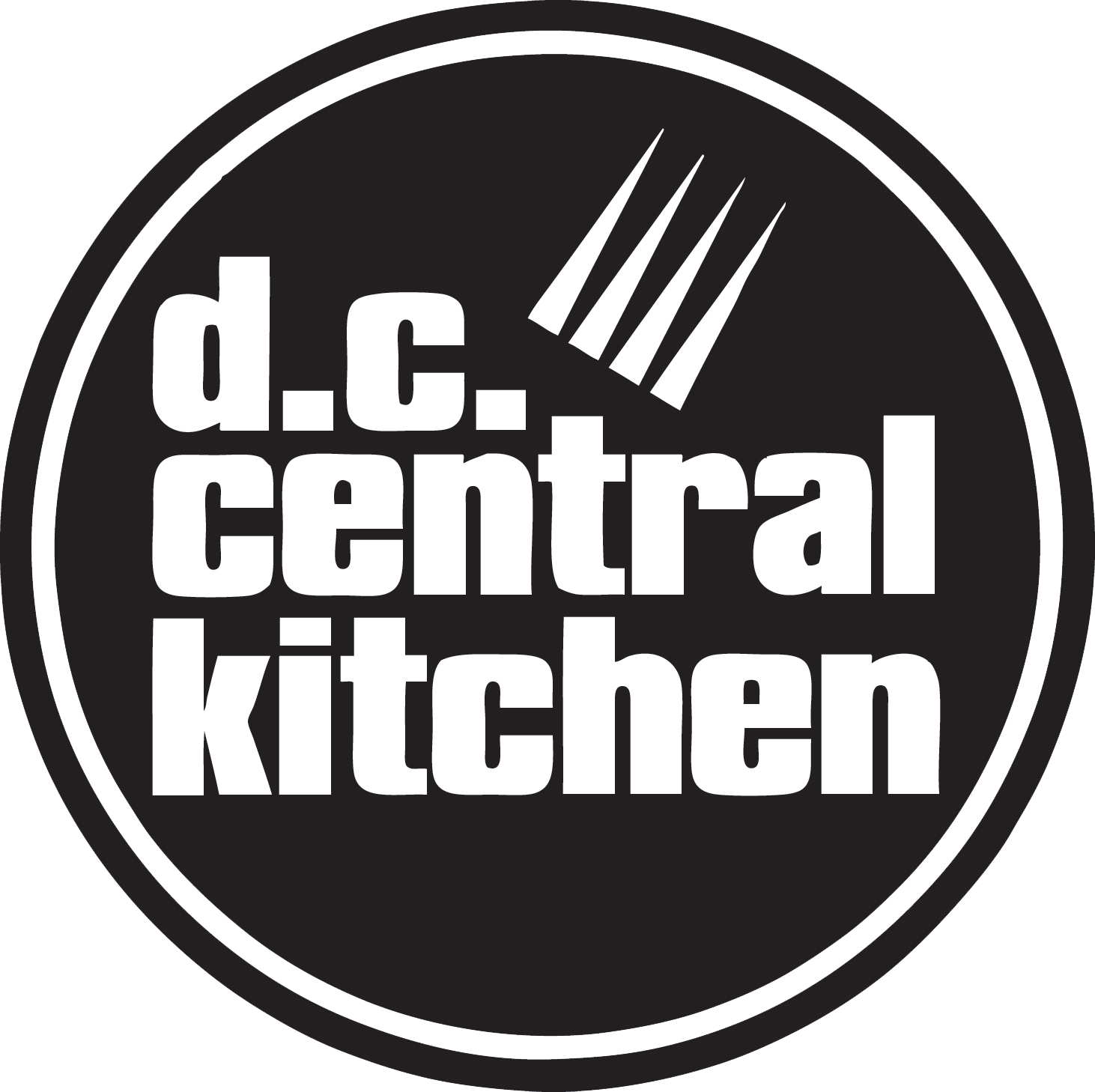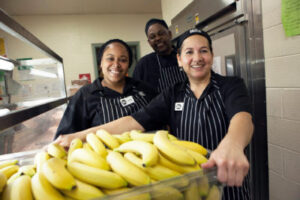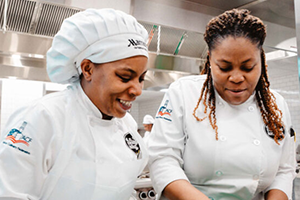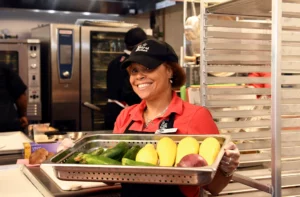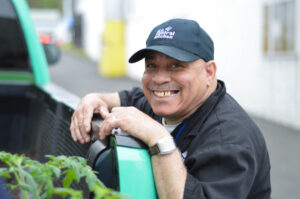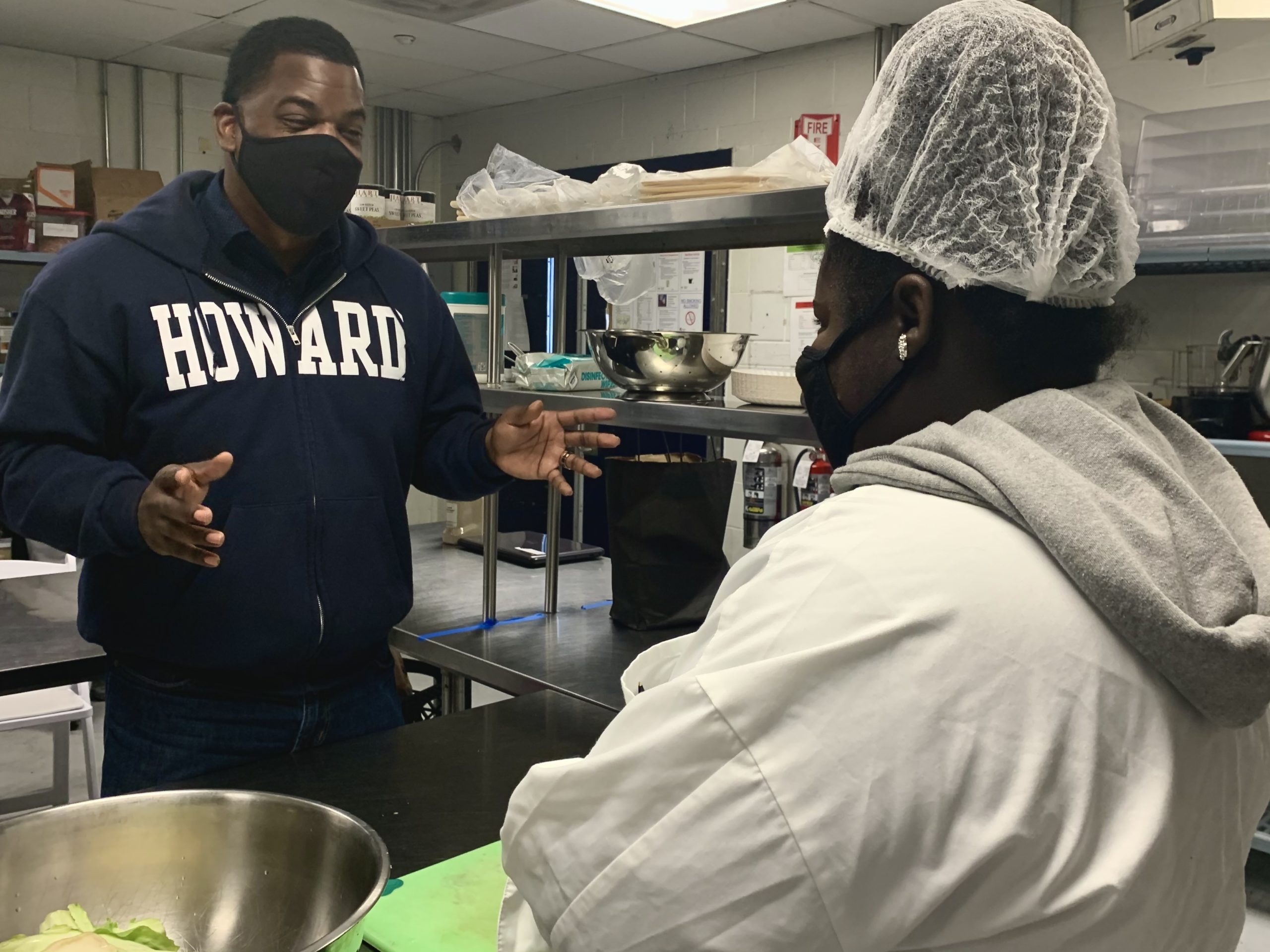This past January, DC Central Kitchen was excited to welcome Rasheem Rooke to our team as Director of Workforce Development. Rasheem brought with him an impressive background of supporting DC residents, including a leadership role at the College Success Foundation where he holistically supported DC students navigate their college experience and earn their degree. His experience and passion made him the perfect fit to lead our renowned Culinary Job Training program. But after only a few short months on the job, Rasheem found his role shifting to address the urgent needs of COVID-19 and its impact on the DC community.
“I began January 27, 2020. So while I have been here for roughly nine, ten months, I still feel brand new because our program had to stop early on as a result of the COVID-19 pandemic and we did some reshuffling and reshaping of what, as a team, we were doing in response to COVID-19.”
In March, as COVID-19 cases and food insecurity begin to rise at an alarming rate, Rasheem’s role shifted to managing a fast-growing grocery distribution effort at sites across the city. “I had to shift gears and learn how to connect the dots with regard to emergency response feeding because that’s what our program became: a part of the overall initiative to feed communities within the District of Columbia.”
DC Central Kitchen’s life-changing solutions to hunger and poverty are critical in normal times, but in response to COVID-19, our work has become a lifeline for DC’s children, seniors, and families. In March, we hired nearly 20 DCCK Culinary Job Training graduates who had been displaced by the pandemic, providing living wages and comprehensive benefits. With the support of Rasheem and his team, we shifted our priorities and resources to distribute grocery bags at dozens of sites across the city, scaling an initial distribution of 200 grocery bags per week to over 5,000 bags per week, each bag containing enough produce for three home-cooked meals for a family of four. When asked about the community’s response to DCCK’s distribution of fresh produce, Rooke noted: “[it got to the point where] if we showed up to a community with 700 bags of produce, it would be gone within an hour and a half.”
And Rasheem’s role wasn’t the only one effected by the pandemic. “Three weeks prior, Tony Vinson, Recruitment and Intake Coordinator, was doing admissions and now I’m asking him to get prepared to distribute food. And Jeff Rustin, Community Outreach Specialist, was teaching a class on self-empowerment, as well as case management, and now he’s getting prepared to go out into a community that is being ravaged by COVID-19 and be a front-line worker.” Despite the health concerns involved in being a frontline worker, Rasheem and his team rose to the challenge. “[The team] was like, ‘what do we have to do? Where do we have to go? What do we have to do to get this done?”
Since March, DCCK has served over X million meals and distributed $1 million worth of fresh produce in thousands of grocery bags. But our work is not done. According to a new report (link to DC food policy council report), food insecurity in DC is likely to become even worse, especially among kids and seniors. And DC Central Kitchen is committed to continuing to provide mobile meals and groceries to the community into 2021.
In addition to food insecurity, COVID brought with it a number of mental health challenges. Speaking about enrollees and graduates of the CJT program, Rasheem remarked: “For a lot of people the expectation was that we would just disappear and we would go away. But I have two phenomenal case managers…and [they stayed in touch with students through] weekly phone calls, weekly emails, first and foremost to just check in on everyone and see how they were doing, also to let them know that we were providing fresh produce.”
And now, after seven months of emergency response work, the team was able to restart the Culinary Job Training program in October under Rasheem’s leadership. To have the space needed to maintain social distancing, the acclaimed program moved out of our basement headquarters and re-started operations at Nationals Park. Restarting this program is a game-changer for our students and our hospitality community, providing culinary training, case management, self-empowerment classes, group counseling, personalized job coaching and more at no cost to our students.
As for Rasheem, the transition back to focusing on job training has been welcome. “We were able to go back to where we were and look for opportunities to do more, be more, and try and build a program that exemplifies excellence.” And of the students, he notes: “Seeing our students settle into their roles as students, understanding the importance of learning what they need to learn so they can get a job after the program, it’s encouraging. It’s encouraging.”

